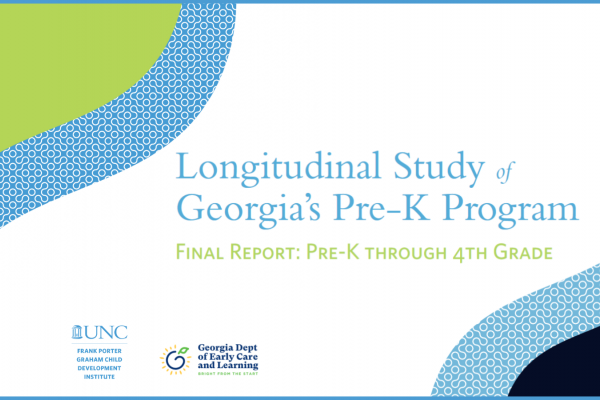
Georgia study shows that important pre-K benefits persist through fourth grade
In June 2023, researchers from the UNC Frank Porter Graham Child Development Institute (FPG) issued, “Longitudinal Study of Georgia's Pre-K Program Final Report: Pre-K Through 4th Grade.” This longitudinal study followed a statewide sample of 1,169 children who attended Georgia’s Pre-K Program in 2013–14 through their 4th grade year in 2018–19. Results from the study—one of the only examinations of the long-term benefits to children who attend a government-funded universal pre-K program available to all of the state’s residents—show that Georgia’s Pre-K Program prepares students to enter kindergarten with the key strength of building foundational literacy skills for reading.
FPG partnered with the Georgia Department of Early Care and Learning (DECAL) using standardized child assessments that measure skills across learning domains. This enabled the scores to be compared to a nationally representative sample of children of the same age, critical since pre-k is available to all children in Georgia. A comparison sample of children who did not attend any pre-k program was added in the third grade year. The study, which featured observations of classroom quality over time to measure the quality of teacher-child interactions, also included a subsample of English-Spanish dual language learners.
Children who attended Georgia’s Pre-K Program had better language, literacy, and executive function skills in third and fourth grades than the comparison group of children who did not attend any pre-k program. These results are similar to the findings of the longitudinal study, in which children who attended Georgia’s Pre-K had higher scores in foundational literacy skills relative to the national norming sample. These findings suggest that foundational literacy skills, a focus of pre-k, were not obtained by children in the comparison sample.
“Given the amount that is invested in state pre-K programs, it is really important to continue to investigate whether those programs and their quality are truly supportive of children's learning, development and future growth,” says Hong. “This study and studies like it are important to continue as states develop their pre-K infrastructure.”
The largest gains were seen during Georgia’s pre-K and fourth grade school years, with small to moderate gains found in measures assessing literacy, math, and social skills. On most outcomes, initial gains remained through kindergarten, while scores started to level off in first grade. While students in the study are at or above the national average on most measures at the end of fourth grade, the rate of growth in pre-k and kindergarten was not maintained in later grades with the exception of larger growth in social skills and math in fourth grade. Since an interim report was released in 2021 about this study, when the students were in third grade, researchers noted additional gains for children in social skills and in math in fourth grade.
Dual Language Learners had scores slightly below the national norm in fourth grade for skills measured in English and well below the national norm for skills measured in Spanish. These students had the lowest levels of behavior problems throughout the study.
While vocabulary development is a key area of growth for all children ages birth to five, acquisition of language skills also occurs from kindergarten to fourth grade. The study found that opportunities to support this growth are warranted. Although classroom quality is highest in pre-K, the quality is still in the moderate-to-high range throughout kindergarten through fourth grade.
FPG Senior Research Scientist Sandra Soliday Hong, PhD, notes that this longitudinal study reflects a deep investment by DECAL in ensuring that children fully benefit from enrollment in Georgia’s Pre-K and from aligned and supportive K-4 experiences. The study also reflects a commitment to continuous improvement through an established state-university partnership. Hong says that DECAL is devoted to having a high-quality system and supports for children that are effective. She calls this study a credit to them and reflective of their innovative practices.
“Given the amount that is invested in state pre-K programs, it is really important to continue to investigate whether those programs and their quality are truly supportive of children's learning, development and future growth,” says Hong, the author of this report. “This study and studies like it are important to continue as states develop their pre-K infrastructure.”
Hong’s colleagues on this paper include its lead statistician Sabrina Zadrozny, PhD, FPG Data Management and Analysis Core Director, and Ellen Peisner-Feinberg, PhD, the initial principal investigator of the report who oversaw data collection. Other team members are FPG Project Coordinator Jada Walker, MEd, FPG Research Assistant Judith L. Owen, and former FPG staffers Elizabeth N.G. Love, and Jennifer Detwiler Osborne.
Hong believes that this research will contribute to the body of literature suggesting that attending quality pre-K programs is beneficial for children's short-term and long-term gains. “I hope that this work will inform continued investment and quality improvement in Georgia’s system as well as other state systems looking at implementing similar programs,” she says.
